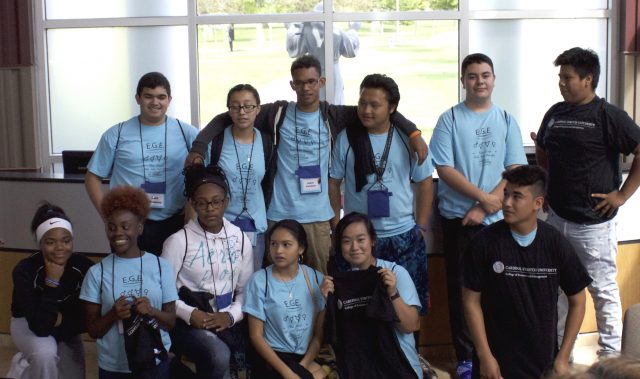On December 8, These Teens Mean Business will host its culminating event called the Teen Pitch and Launch event at The Spark on East Washington Ave.
These Teens Means Business is an incubator program that teaches teenagers of color the skills they will need to navigate the 21st century focused mostly on entrepreneurship. Next month, thirteen teenagers will present and pitch businesses they have created from the ground up to a group of business owners, family, friends and teachers.
The event is a culmination of a ten-week incubator program during which teens compete to be crowned Top CEO. The person who is named the top CEO will receive $1,000, with half of that money being in the form of a scholarship that they can use for college.
But the program, as well as the culmination event, is about much more than being named the best CEO of the class. It is a chance for kids (predominantly but not exclusively of color) to feel empowered to impact both their lives and their communities.
Roxie Hentz launched CEOs of Tomorrow, the organization behind These Teens Mean Business, with the idea that a focus on entrepreneurship would help make more than just future business owners. The skills people develop when they learn to think as entrepreneurs are transferable to almost every successful venture. And, the kids learn to address social problems they care about.

“The discrimination of people with darker skin tones, homelessness, marine pollution, police brutality, premature birth, mental health, animal abuse. Racial Unity. These teens want to bring Latino and African-American people together because they believe that unified we can accomplish more,” CEO Roxie Hentz told Madison365. “So these are issues our youth are struggling with. Rather than sitting idly in frustration or feeling like there’s nothing they can do, we empower them to do something that impacts their lives. And we wrap a business model around that.”
Hentz says that wrapping business principles around the concepts of the program allows the students a chance to make revenue — they keep 100 percent of any revenue their businesses earn — but also make a social impact.
The incubator program is offered twice a year. Many students go through more than once, trying out different business ideas and learning what works. The learning material is advanced and Hentz says that is the reason they offer the incubator to only a few students at a time.
“Our content is college level. We just recently had college professors come in and teach marketing concepts. We keep our (participation) numbers low because our content is rigorous,” Hentz says. “The student is in an environment where expectation is high and failure is not an option. We create a safe environment where we drop all the barriers, where they don’t have to feel uncomfortable because of race or economics. Our program creates a family. When they’re with us we push them to be the best that they can be and that’s why these kids reach high levels.”
Many of the students are referred to CEOs of Tomorrow by community groups like NIP and UW Odyssey program. Centro Hispano also refers kids. And some kids who come through the incubator were having a difficult time in public schools but then do very well in the program.
Hentz says that the nature of the program is that any kids will succeed because they are creating something that inspires them.
“So our challenge, our goal, our quest is to inspire our students on day one to know, ‘you can do this and we’re going to be there with you every step of the way,” Hentz says. “100 percent successfully complete and they are full of feeling like ‘I am smart. I am capable.’ And we tell them to take that same mentality back to school. Whenever they feel questionable about what they’re doing, we want our people of color to know there is no limit to what they can accomplish. Deconstructing the constructs that have been institutionalized is the fabric of what we’re doing.”
Which is why the event on December 8 is not called a graduation but a culmination. A culmination of these students having an idea, learning how to develop that idea and turning it into something they can pitch to real business people in the real world.
That’s precisely what will happen at the event. The people who attend will be providing students with feedback about their business idea. The students will be able to see what is or isn’t a good idea or a good business model.
While not all of the students will go on to run a business, the concepts they learn in the incubator allow them to be way ahead of their peers in areas of financial literacy, problem solving, public speaking, proper risk-taking and leadership.
“Entrepreneurship should be taught in school,” Hentz said. “It encompasses all the 21st century skills that are needed. So we’re not just trying to create entrepreneurs, although that happens. The goal is to have our youth be entrepreneurial in their thinking. Those skills are necessary for their personal and professional lives.”
The These Teens Mean Business event will be at American Family Insurance’s new state-of-the-art building, The Spark, from Noon until 5 pm on December 8. Summit Credit Union is also a supporter of the program and provides financial literacy and budgeting training for all of the students, as well as access to checking and savings accounts.
“The students will pitch their business idea to family, friends, business people and guests. And the guests can shop or buy from these businesses and give customer feedback,” Hentz says. “And it’s neat to see teens learn how to run a business. For our teens, we believe they are wrapped in brilliance.”




























